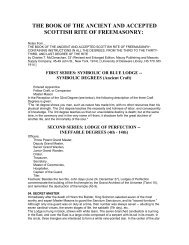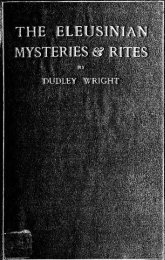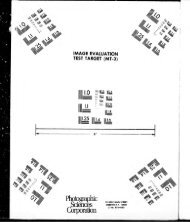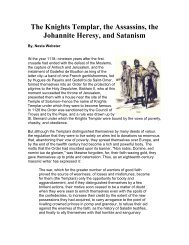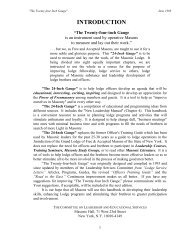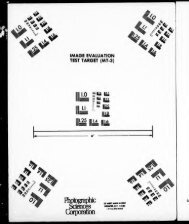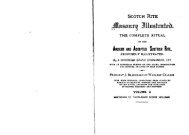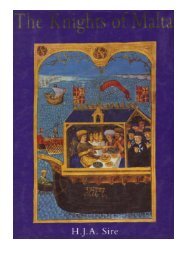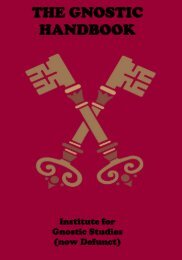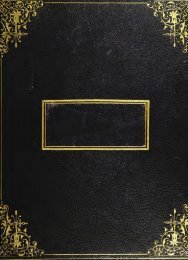- Page 1:
FREE MASONRY. ITS PRETENSIONS EXPOS
- Page 4 and 5:
TO FREE MASONS. BRETHREN, HAVING de
- Page 6 and 7:
vi MASONIC AUTHORS. 9. TannehilVs M
- Page 8 and 9:
viii PREFACE. Georgia, . . . . 30 L
- Page 10 and 11:
X PREFACB. ties exist they often hu
- Page 12 and 13:
XU PREFACE. name of the author shou
- Page 14 and 15:
XIV PlUtFACfc. been impeded by the
- Page 16 and 17:
XVI PREFACE. ' Another says, " It i
- Page 18 and 19:
\ FEBTENSIONS OF FREE MASONRY* char
- Page 20 and 21:
« 4 PRETENSIONS OF FllEK MASONBY*
- Page 22 and 23:
6 FBBTBN8IOM OF IBIS XASONHT, CHAPT
- Page 24 and 25:
8 PRETENSIONS OF FREE MASONRY. orig
- Page 26 and 27:
10 FKETEWBIOffB UF JKEE MASONRY. v
- Page 28 and 29:
t% PRETENSIONS OF FREE MASONRY. mys
- Page 30 and 31:
14 PRETENSIONS OF FREE MASONRY. mem
- Page 32 and 33:
16 PRETENSIONS OF TREE MAbUNRY. «
- Page 34 and 35:
18 PRETENSIONS OF FREE MASONRY, 300
- Page 36 and 37:
20 PRETENSIONS OF FREE MASONRt. 1 i
- Page 38 and 39:
22 PRETENSIONS OF FREE MASONRF. CHA
- Page 40 and 41:
24 PRETENSIONS OF FREE MASONRY. lar
- Page 42 and 43:
26 PRETENSIONS OF FREE MASONRY, "Wi
- Page 44 and 45:
28 PRETENSIONS OF FREE MASONRY. , d
- Page 46 and 47:
30 PRETENSIONS OF FREE MASONRY. tk>
- Page 48 and 49:
32 PRETENSIONS OF FRM MASONRY. seco
- Page 50 and 51:
34 PRETENSIONS OF FREE MASONRY. CHA
- Page 52 and 53:
JJ6 ' BttEiENSlOXS OF FRJiL MASONRY
- Page 54 and 55:
38 PRETENSIONS OF FREE MASONRY. v b
- Page 56 and 57:
40 PRETENSIONS OF FREE MASONRY. ope
- Page 58 and 59:
42 PRETENSIONS OP FREE MASONRT. bec
- Page 60 and 61:
. M MASONRY. *'' Brethren, submit y
- Page 62 and 63:
46 MASONRY. were before the first m
- Page 64 and 65:
48 MASON**. saymg things, foresee t
- Page 66 and 67:
50 MASONRY. THE FREE MASON'S LIBRAR
- Page 68 and 69:
52 MASONRY. of the lodge. In accord
- Page 70 and 71:
~A MASONRY. " The third class (Mast
- Page 72 and 73:
56 EMBLKM8 OP FRKE MASONRY. On the
- Page 74 and 75:
58 EMBLEMS OF FREE MA&ONKY. after t
- Page 76 and 77:
60 EMBLEMS OF FREE MASONRY. A white
- Page 78 and 79:
62 EMBLEMS OF ROYAL ARCH MASONRY. H
- Page 80 and 81:
J 64 EMBLEMS OF ROYAL ARCH MASONRY.
- Page 82 and 83:
66 APPRENTICE'S DEGREE. four cardin
- Page 84 and 85:
68 FALLOW CRAFT'S DEGREE. make, we
- Page 86 and 87:
70 FELLOW CRAFT'S DEGREE. The fire
- Page 88 and 89:
72 FELLOW CRAFT'S DEGREE. This is a
- Page 90 and 91:
74 FELLOW CRAFT'S DEGREE, names in
- Page 92 and 93:
76 FREE MASOXRY A PIOUS FRAUD. CHAP
- Page 94 and 95:
78 FREE MASONEY A PIOUS FRAUD. She
- Page 96 and 97:
80 FREE MASOJJRY A PIOUS FRAUD. rea
- Page 98 and 99:
3*2 FREE MASONRY A PIOUS FRAUD. ing
- Page 100 and 101:
m 84 ' FREE MASONRY A PIOUS FRAUD.
- Page 102 and 103:
86 FREE MASONRY. Having established
- Page 104 and 105:
88 FREE MASONRY. with reverence, an
- Page 106 and 107:
90 FREE MAS0XRY. decayeth and driet
- Page 108 and 109:
92 FREE MASONRY. spector General, 1
- Page 110 and 111:
94 THE RUFFIANS. and, afterwards, t
- Page 112 and 113:
96 THE RUi'FiAKS. in the temple, wh
- Page 114 and 115:
96 DR. DALCHO'S OPINIO* OF THE MAST
- Page 116 and 117:
100 SUBLIME DEGREE OF MASTER MASON.
- Page 118 and 119:
102 SUBLIME DEGREE OF MASTER MASON,
- Page 120 and 121:
I [ 104 SUBLIME DEGREE OV MASTER MA
- Page 122 and 123:
IOCS SUBLIME DEGREE OF MASTER MASOX
- Page 124 and 125:
10$ SUBLIME DEGREE OF MASTER MASON.
- Page 126 and 127:
110 MASONIC DEGREE*. existence of a
- Page 128 and 129:
112 MASONIC DEGREES. master's and t
- Page 130 and 131:
114 MASONIC DEGREES, has never been
- Page 132 and 133:
116 FREE MASONRY. CHAPTER XIX. " Co
- Page 134 and 135:
118 FREE MASONRY. tyling the lodge
- Page 136 and 137:
120 FREE MASOKR1. bracing the pass-
- Page 138 and 139:
1^2 PBEE MASONRY. aspiring fellow c
- Page 140 and 141:
124 ORIGIN OF FREE MASONRY. tects,"
- Page 142 and 143:
126 ORIGIN OF FREE MASONRY. murmuri
- Page 144 and 145:
128 ORIGIN OF FREE MASONRY. who wit
- Page 146 and 147:
130 ORIGIN OF FREE MASONRY. lightly
- Page 148 and 149:
133 ORIGIN OF FREE MASONRY. lized,
- Page 150 and 151:
134 ORIGIN OF FREE MASONRY. limbs,
- Page 152 and 153:
136 ORIGIN OF FREE MASONRY. ed to c
- Page 154 and 155:
138 MASONIC OATH. She may swell her
- Page 156 and 157:
140 MASONIC OATH. &c; " not write,
- Page 158 and 159:
142 MASONIC OATH. " Father Adam, cr
- Page 160 and 161:
144 MASONIC OATH. u TMpi denUjae ma
- Page 162 and 163:
14(5 FREE MASONRY'. CHAPTER XXIV. C
- Page 164 and 165:
148 FREE MASONRY. it have been endu
- Page 166 and 167:
150 KREE MASONRV. " What do you inf
- Page 168 and 169:
152 FREE MASONRY. Paschal, describi
- Page 170 and 171:
154 FREE MASONRY, Preston's Illustr
- Page 172 and 173:
156 FREE MASONRY, licentiousness ?
- Page 174 and 175:
158 FREE MASONRY, cellertt moral in
- Page 176 and 177:
160 ROYAL ARCH MASOXfti. every gopd
- Page 178 and 179:
162 ROYAL ARCH MASONRY. the Grand L
- Page 180 and 181:
164 ROfAL ARCH MASONRI!*. not only
- Page 182 and 183:
166 ROYAL ARCH MASONRY. Grand Lectu
- Page 184 and 185:
168 ROYAL ARCH MASONRY. on its subl
- Page 186 and 187:
170 REVIEW OF medley of her pretens
- Page 188 and 189:
172 REVIEW OF every name both a gra
- Page 190 and 191:
174 REVIEW OF To which I add a line
- Page 192 and 193:
176 REVIEW OF CHAPTER XXIX. Contain
- Page 194 and 195:
178 REVIEW or • 10. " The mind is
- Page 196 and 197:
180 REVIEW O*' tares, as he evident
- Page 198 and 199:
182 REVIEW or ted divinity; or the
- Page 200 and 201:
0 184 REVIEW OF pies," says Mr. T.,
- Page 202 and 203:
186 FREE MASONRY PARALLEL WITH THE
- Page 204 and 205:
188 FREE MASONRY PARALLEL WITH THE
- Page 206 and 207:
190 FREE MASONRY PARALLEL WITH THE
- Page 208 and 209:
# 192 FREE MAbONRV PARALLEL WITH TH
- Page 210 and 211:
194 TO PROVE ANY GREAT MAN A FREE M
- Page 212 and 213:
196 TO PROVE ANT GREAT MAN A FREE M
- Page 214 and 215:
200 TOWN'S SPECULATIVE MASONRY. " D
- Page 216 and 217:
20*2 HOW TO fftOVE BY FREE HAtfONKT
- Page 218 and 219:
304 TOWN'S co-existent with true re
- Page 220 and 221:
206 CONFUCIUS A FREE MASON. Chinese
- Page 222 and 223:
208 FAEfi MASONRY. tians, all agree
- Page 224 and 225:
210 THE MASONIC WORD, Verily, the G
- Page 226 and 227:
•212 THE MASONIC WORD Speculative
- Page 228 and 229:
214 THE MASONIC WORD, sponsibility,
- Page 230 and 231:
216 THE MASONIC WORD. books of Mose
- Page 232 and 233:
218 FREE MASONRY AND NATURAL RELIGI
- Page 234 and 235:
220 FREE MA&0NRY AND NATURAL RELIGI
- Page 236 and 237:
222 ,REV. MR. STEARSs' INQUIRY'. CH
- Page 238 and 239:
224 REV. MR. STEARNS' INQUIRY. writ
- Page 240 and 241:
228 REV. MR. STEARNS 1 INQUIRY, Mr*
- Page 242 and 243:
228 FEEK MASONRY. the Deity•, is
- Page 244 and 245:
230 FREE MASONRY. were an oversight
- Page 246 and 247:
232 FREE MASONRY. close by their pl
- Page 248 and 249:
234 FREE MASONRY. religious sect, o
- Page 250 and 251:
"236 FREE MASONRY. her has caused d
- Page 252 and 253:
\ 238 ANCIENT FREE MASONRY IS DEISM
- Page 254 and 255:
240 ANCIENT FREE MASONRV IS DElfcM.
- Page 256 and 257:
m MftWKT T*W MAStONRY IS 9KIS*. of
- Page 258 and 259:
844 ANCIENT FREE MASONRY IS DEISM.
- Page 260 and 261:
246 ANCIENT FREE HA80NRT 18 DK18V.
- Page 262 and 263:
348 ANCtSNT FREE MASONRY IS DEISM*
- Page 264 and 265:
'250 AXCIE.NT FREE MASONRY IS DEISM
- Page 266 and 267:
M52 -ANCIENT t'REE MASONRY IS DEISM
- Page 268 and 269:
254 ANCIENT FEEE MASONRY IS DEISM.
- Page 270 and 271:
256 ANCIENT FREE MASONRY IS DEISM.
- Page 272 and 273:
258 " SPIRIT Or THE DOCTRINE OF FRE
- Page 274 and 275:
260 '" sfiKrt or TBS DOCTRINE or FR
- Page 276 and 277:
262 u SPIRIT Or THE DOCTRINE 07 FRE
- Page 278 and 279:
264 " SPIRIT OF THE DOCTRINE OF FRE
- Page 280 and 281:
966 U SPIRIT OP THE DOC TRIM;; OF F
- Page 282 and 283: 268 u SPIRIT Or THK DOCTEIIfE OF FR
- Page 284 and 285: 270 " SPIRIT Or THE DOCTRINE OF FRE
- Page 286 and 287: 372 " SPIRIT OV THE DOCTRINE OF FRE
- Page 288 and 289: j£?4 ABBE BARRl'EL AMI Book of Con
- Page 290 and 291: 276 their volumes, lest the purity
- Page 292 and 293: 278 ABBE BARRUEL long to the societ
- Page 294 and 295: 280 ABBE BAR$UEL It is not too late
- Page 296 and 297: 282 ABBE BARRUEL that time, so dwel
- Page 298 and 299: 284 ABBE BARRtTJX and equality; and
- Page 300 and 301: Wb ABM BAR&UKIi'S VIBWS Chrirtcmd h
- Page 302 and 303: 888 ABBE BABRUEL'S VIEWS tianity, t
- Page 304 and 305: 290 ABBE BARIIUEL'S VIEWS one of th
- Page 306: 192 ABBE BARRUEL'S VIEWS " It was t
- Page 309 and 310: OF FREE MASONRY. 295 lowing conclus
- Page 311 and 312: OF FKEE MASONRY. 297 " If we lay as
- Page 313 and 314: OF FREE MASONRY. 299 are seated on
- Page 315 and 316: OF FREE MASONRY. 301 rent degrees,
- Page 317 and 318: OF FREE MASONRV. 303 4 you have the
- Page 319 and 320: OF FREE MASONRY. 305 the whole scie
- Page 321 and 322: OF FREE MASONRY. 307 tion of the ma
- Page 323 and 324: OF FREE MASONRY. 300 which is to be
- Page 325 and 326: OF FREE MASONRY. 311 of this volume
- Page 327 and 328: OP FREE MASONRY. 313 V for one, I s
- Page 329 and 330: OF TREE MASONRY. 315 ry splendid lo
- Page 331: OF FREE MASONRY. 317 tire Religions
- Page 335 and 336: OF FREE MASONRY. 321 " Thus,accusto
- Page 337 and 338: OF FREE MASONRY. 333 universal, and
- Page 339 and 340: OP FREE MASONRY. 325 the head of Fr
- Page 341 and 342: Or FREE MASONRY. 327 CHAPTER XLVIII
- Page 343 and 344: OF fBU MASONRY* 329 secrets find nu
- Page 345 and 346: OF FREE MASOAIRV. 331 they learned,
- Page 347 and 348: OF FBSS MASONRY. 333 ' Zwack assume
- Page 349 and 350: FREE MASONRY THE TOOL OF THE ILLUMI
- Page 351 and 352: EREE MASONRY. jfift you to co-opera
- Page 353 and 354: AND FE1E MASONRY. 339 and the most
- Page 355 and 356: AND TREE MABOttHr. 341 exist doctri
- Page 357 and 358: THB TENANCY OF SECRST ASSOCIATIONS.
- Page 359 and 360: OF THE NATURE OF SECRET SOCIETIES.
- Page 361 and 362: THE TENDENCY OF SECRET ASSOCIATIONS
- Page 363 and 364: THE TENDENCY OF SECRET ASSOCIATIONS
- Page 365 and 366: THE TENDENCY Of SECRET ASSOCIATIONS
- Page 367 and 368: THE UNKNOWN OR1GIN OF TREE MASONRY.
- Page 369 and 370: THE TENDENCY OF SECRET ASSOCIATIONS
- Page 371 and 372: FOR THE DISSEMINATION QF LIGHT. 357
- Page 373 and 374: FOR THE DISSEMINATION OP LIGHT. 369
- Page 375 and 376: SPARTACUS (WEISHAUPT) TO CATO (ZWAC
- Page 377 and 378: ILLUMINISM. 363 to deal with the de
- Page 379 and 380: 4 iLLuaciKiM. 385 enlightened sages
- Page 381 and 382: 1LLUMINISM. 367 edly he assures the
- Page 383 and 384:
1LLUMINI8M. m ter to the arts of se
- Page 385 and 386:
ILLUMlNISM. 371 No form of folly in
- Page 387 and 388:
1LLUMIN1SM. 373 u The scrutators of
- Page 389 and 390:
1LLUM1N1SM. 375 ties of wine, so is
- Page 391 and 392:
ILLUMINISM. 377 u The second grand
- Page 393 and 394:
HIGHER DEGREES OF FREE MASONRY. 379
- Page 395 and 396:
HIGHER DEGREES OF FREE MASONRY. 381
- Page 397 and 398:
HIGHER DEGREES OF FREE MASONRY. 383
- Page 399 and 400:
ROBISON'S ELOQUENT AND PATRIOTIC AP
- Page 401 and 402:
ELOQUENT AND PATRIOTIC APPEAL. 387
- Page 403 and 404:
ADDRESS TO THE FRATERNITY. 389 When
- Page 405 and 406:
FIRST EXTENSION OF FREE MASONRY. 39
- Page 407 and 408:
CONCLUSION, 303 her ninety degrees,
- Page 409 and 410:
CONCLUSION. 395 tAe fraternity," an
- Page 411 and 412:
TABLE OF CONTENTS. CHAP. L Pretensi
- Page 413:
TABLE OF CONTENTS. 399 phemy, drawn



